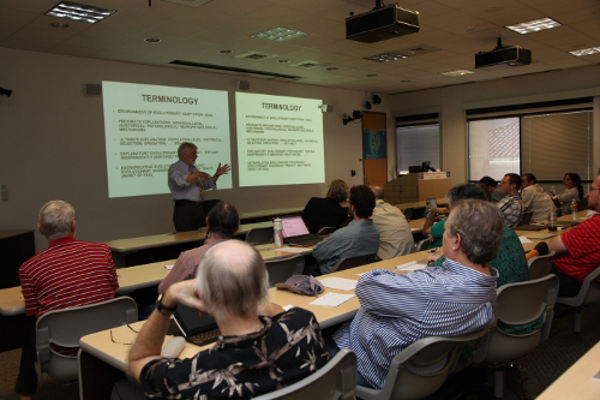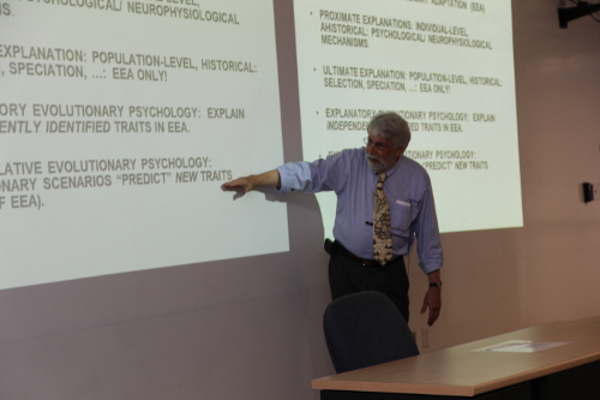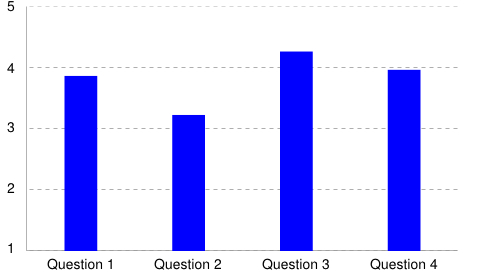Seminars and Panels

According to mainstream ‘evolutionary psychology’ evolutionary theory makes an important methodological contribution to human social psychology. Consideration of plausible evolutionary scenarios regarding early human social behavior are said to provide a methodologically independent source of insights, identifying some psychological theories as those ‘predicted’ or otherwise especially supported by evolutionary theory. The methodological practices characteristic of ‘evolutionary psychology’ are such that the theories so identified are typically reductionist or nativist theories which minimize the role of social structures and of learning in explaining human social behaviors.
In fact, the relevant sort of methodological independence guarantees that such scenarios do not favor reductionist or nativist theories over theories that emphasize the role of learning and of social structures (or vice versa). So, in practice, appeals to evolutionary theory function as a sort of methodological anesthesia, directing psychologists’ attention away from scientifically important alternatives to reductionist or nativist theories.
About Professor Richard N. Boyd
Richard Boyd is Susan Linn Sage Professor of Philosophy and Professor of Science and Technology Studies at Cornell University. He did his undergraduate work (mathematics) and graduate work (philosophy) at MIT. He has held teaching appointments at The University of Michigan, The University of California Berkeley, Harvard, MIT, The University of Canterbury (NZ), The University of Melbourne, and Claremont-McKenna College. He works on issues in philosophy of science, the philosophy of biology, the philosophy of mind, and metaethics.


Audience Reception |
n = 41 |

Question 1 - How interesting was the topic to you?
Question 2 - How relevant was the topic to your interest and field of research?
Question 3 - How would you rate the quality of the presentation?
Question 4 - How would you rate the quality of the audience's interaction with the speaker?
Selective Comments
"Outstanding presentation. Dr. Boyd was able to break down a vast amount of material quickly. Further, excellent choice of facilities."
- 2017 - 2018
- 2016 - 2017
- Behavioral Concepts and the Sciences of Human Behavior
H. Longino Apr 21, 2017 - Insane Asylums and Genetics: How Human Heredity Became a Data Science
T. Porter Feb 17, 2017 - The Nature of Pride: The Emotional Origins of Social Rank
J. Tracy Jan 23, 2017
- Behavioral Concepts and the Sciences of Human Behavior
- 2015 - 2016
-
Public Ethics, Politics and Sociobiology
M. P. Sheldon Mar 11, 2016 -
Classifying People by Color: How Racial Categories Change Over Time
A. A. Martinez Feb 29, 2016 -
The Origin of Social Impulse: E.O. Wilson's Recent and Controversial Rejection of Kin Selection in Historical Context
A. Gibson Dec 4, 2015
-
Public Ethics, Politics and Sociobiology
- 2014 - 2015
-
Special Event: Lone Star History of Science Meeting Writing the Origin with Burned Fingers: Darwin's Penance for the "Sin of Speculation"A. Sponsel Apr 3, 2015 - Welfare, Work, and Witness: Why Clinical Research Can Survive the Death of a Healthy Human Subject
L. Stark Apr 3, 2015 - The Distinctive Significance of Systemic Risk
A. James Mar 6, 2015 - The Devil's Heritage: Masuo Kodani, the "Nisei Problem," and Social Stratification at the Atomic Bomb Casualty Commission in Japan (1946-1954)
V.B. Smocovitis Jan 28, 2015 - Atypical Combinations and Scientific Impact
B. Uzzi Dec 8, 2014 - Psychology of Science and Technology
M. Gorman Nov 17, 2014 - How Economics Shapes Science
P. Stephan Sep 10, 2014
-
- 2013 - 2014
- The Decision to Put David Vetter in the Bubble
J. H. Jones Apr 16, 2014 - Ethical Paradoxes of
Control: Science, Engineering, and the Expansion of Moral ResponsibilityR. Hollander Mar 3, 2014 - 'Broken Symmetry': Humanism, Militarism, and the Dilemmas of Scientific Identity in Nuclear Age America.
J. Wang Feb 17, 2014 - Using Creative Non-Fiction in Teaching Research Ethics
C.M. Klugman Dec 2, 2013 - Does Neuroscience Undermine Responsibility?
W. Sinnott-Armstrong Nov 15, 2013 - Arming Mother Nature: The Birth of Catastrophic Environmentalism
J. Hamblin Oct 18, 2013
- The Decision to Put David Vetter in the Bubble
- 2012 - 2013
- Lead Wars: the Politics of Science and the Fate of America's Children
D. Rosner Mar 25, 2013 - Identifying potential pitfalls in the quantitative appraisal system for scientific careers
A.M. Petersen Dec 3, 2012 - Keeping Secrets: Scientists' strategic management of militarization, 1945-1980
S. Lindee Nov 12, 2012 - Evolutionary Theory as Methodological Anesthesia: Methodological and Philosophical Lessons from Evolutionary Psychology
R.N. Boyd Oct 19, 2012 - Panel on Peer-Review Issues
Oct 11, 2012
- Can technology enable cities to cope with the economic winter?
A. Hampapur Sep 21, 2012
- Lead Wars: the Politics of Science and the Fate of America's Children
- 2011 - 2012
- Engineering Success and Failure on 9/11
S.K.A. Pfatteicher Apr 27, 2012 - Regulating Ionizing Radiation: Flawed Standard, Flawed Ethics
K.S. Frechette Mar 5, 2012 - Do fish feel pain?
C. Allen Jan 25, 2012 - The Ethics of Relevancy
J. Levine Dec 13, 2011 - ORI Cases and How to Protect Yourself from Research Misconduct in Your Labratory
A.R. Price Nov 7, 2011
- Engineering Success and Failure on 9/11











